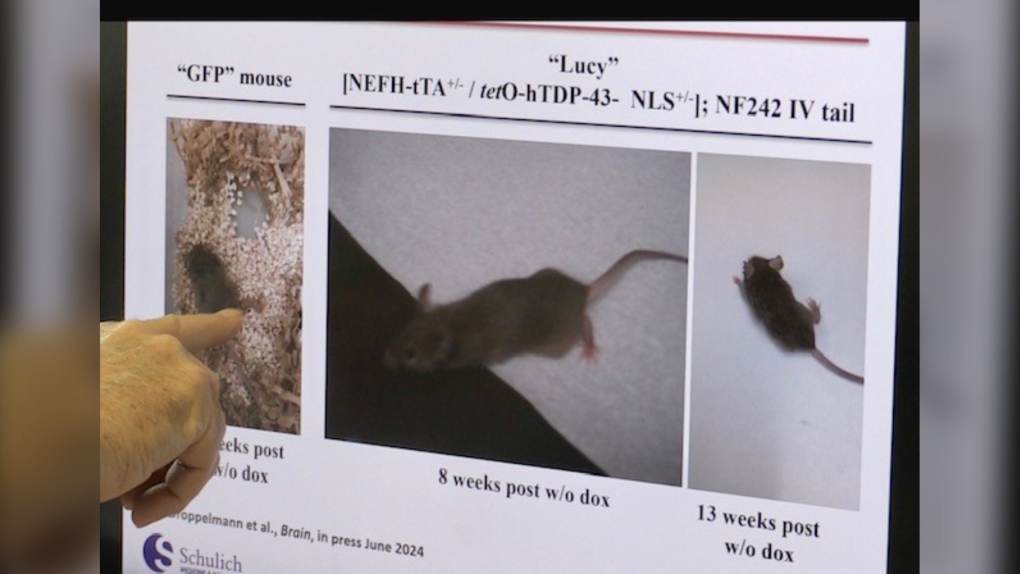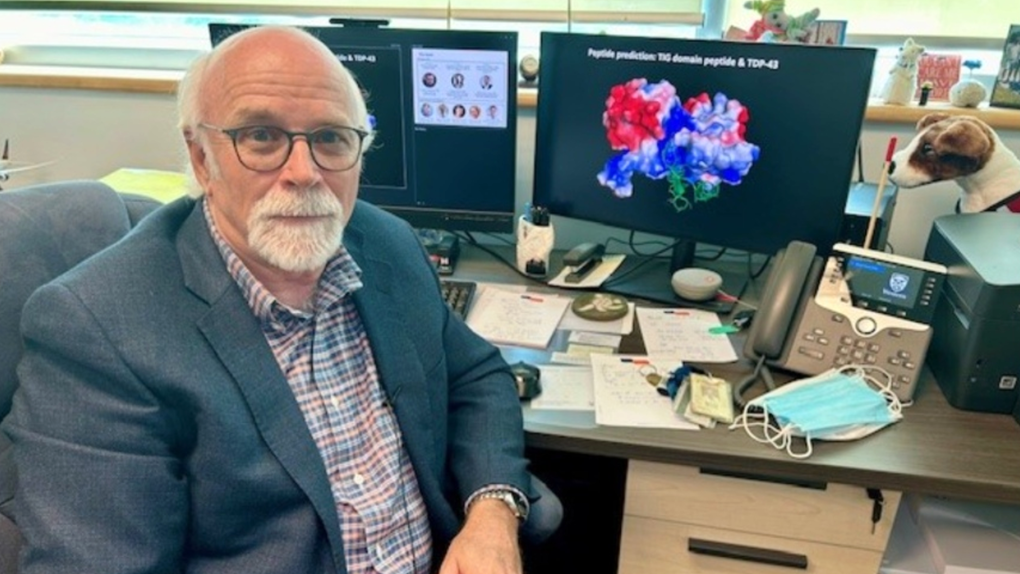Western University researchers unlock potential 'cure' for ALS
New research out of London, Ont.’s Western University is shedding light on a potential cure for ALS, in which the targeting of the interaction between two proteins can halt or fully reverse the disease’s progression.
According to a news release from Western University on Monday, a team of researchers, led by Dr. Michael Strong, have discovered a potential path toward a cure for amyotrophic lateral sclerosis, also known as ALS.
“As a doctor, it’s been so important for me to be able to sit down with a patient or their family and say to them, ‘We’re trying to stop this disease,’" said Strong, Arthur J Hudson Chair in ALS research at Western’s Schulich School of Medicine & Dentistry.
The discovery
Published in the journal Brain, Strong’s team discovered that targeting an interaction between two proteins present in ALS-impacted nerve cells can halt or even fully reverse the progression of the disease.
“Importantly, this interaction could be key to unlocking a treatment not just for ALS but also for other related neurological conditions, like frontotemporal dementia,” said Strong. “It is a game changer.”
According to the study, in nearly all ALS patients, a protein called TDP-43 is responsible for forming abnormal clumps within cells, which causes cell death. In recent years, Strong’s team discovered a second protein, called RGNEF, with functions that are opposite to TDP-43.
The team’s research identified a specific fragment of the RGNEF protein -- named NF242 -- that can “mitigate the toxic effects of the ALS-causing protein.”
As a result, the researchers discovered that when the two proteins interact with each other, the toxicity of the ALS-causing protein is removed, which significantly reduces damage to the nerve cell and therefore prevents its death.
After 30 years of his life working on ALS research with various teams, Strong is confident in what the future holds as a result of the new discovery not just for the treatment of ALS, but for other neurodegenerative diseases.
“I think we can reasonably look at this and say, ‘This is swinging for the bleachers,’ we think in three to five years, we might be looking at something [ALS] that might be cured,” said Strong. “We can, in an experimental model, significantly either completely abolish the [ALS] disease process. Or, in another one do a significant job of slowing it down and changing the course of the disease.”
 Dr. Micheal Strong is points to a picture of a mouse genetically modified to have the pathology of ALS. The mouse died within weeks. In the next two photos is the sister of the same mouse, whereas Lucy was also given the same gene modifications, but with new protein treatments continued to be healthy. (Sean Irvine/CTV News London)
Dr. Micheal Strong is points to a picture of a mouse genetically modified to have the pathology of ALS. The mouse died within weeks. In the next two photos is the sister of the same mouse, whereas Lucy was also given the same gene modifications, but with new protein treatments continued to be healthy. (Sean Irvine/CTV News London)
How researchers got here
The light bulb moment in Strong’s research came seven years ago when the team was working with fruit flies. Flies that were genetically modified to have the pathology of ALS died within 10 to 14 days, whereas a fly typically has a lifecycle of 70 to 80 days.
Those flies with the new pathway Strong said had a longer lifespan, improved motor functions and their nerve cells were protected from degeneration.
The next step in research was using mice, where a mouse named Lucy who had been genetically modified to have ALS was given both treatments.
Her sister did not receive the treatment and died, whereas Lucy lived through experimentation and according to Strong was “doing fine.”
“Best results I’ve ever seen from an animal model,” he said.
What is ALS?
Also known as Lou Gehrig’s disease, ALS is a debilitating neurodegenerative condition that progressively impairs nerve cells responsible for muscle control, leading to muscle wastage, paralysis and death, according to Western.
The average life expectancy of an ALS patient post-diagnosis is two to five years.
Due to the complex nature of the disease, there are no effective forms of therapy that can prevent its progression.
 Dr. Michael Strong is pictured at London, Ont.'s Western University on May 13, 2024. (Sean Irvine/CTV News London)
Dr. Michael Strong is pictured at London, Ont.'s Western University on May 13, 2024. (Sean Irvine/CTV News London)
A ‘gift’ for ALS research
The announcement was made ahead of ALS Awareness Month in Canada.
Also included in Monday’s announcement was a $10 million donation over the next five years from the Temerty Foundation.
Established by Jim Temerty, founder of Northland Power Inc., and Louise Arcand Temerty, the funding will help with the next steps of bringing the newfound treatment to ALS patients.
“Finding an effective treatment for ALS would mean so much to people living with this terrible disease and to their loved ones,” said James Temerty. “Western is pushing the frontiers of ALS knowledge, and we are excited for the opportunity to contribute to the next phase of this groundbreaking research.”
Strong and his team have set a goal to bring their potential treatment to human clinical trials within the next three to five years, “a mission that is fueled by the new gift from the Temerty Foundation,” Western said.
Strong is very cautionary, but if things progress he expects a “cure” is not far off.
“It’s been 30 years of work to get here; 30 years of looking after families and patients and their loved ones, when all we had was hope. This gives us reason to believe we’ve discovered a path to treatment," he said.
-- With files from CTV News London's Sean Irvine
CTVNews.ca Top Stories

Ontario pitches energy partnership with U.S. amid Trump's tariff, Canada annexation threat
In the face of incoming U.S. president Donald Trump’s threat to acquire Canada and impose tariffs, Ontario Premier Doug Ford says he wants to expand its energy supply both sides of the border.
Mexico's President Sheinbaum offers sarcastic response to Trump's 'Gulf of America' comment
Mexico's President Claudia Sheinbaum responded sarcastically on Wednesday to U.S. president-elect Donald Trump's proposal to change the name of the Gulf of Mexico to the Gulf of America.
JetBlue passenger suddenly opens exit door as flight is taxiing for takeoff at Boston airport
A person on board a plane at Boston Logan International Airport that was taxiing for takeoff suddenly opened an exit door and was quickly restrained by other passengers, authorities said.
Canada among 'top 5 losers' in new passport ranking
A new global ranking may raise doubts about Canada's reputation of being open to other countries.
LIVE UPDATES Tracking the L.A. wildfires: 2 dead as major fires at 0% containment, locals describe 'terrifying' escape
A series of wildfires are searing through the Los Angeles area, forcing many to evacuate their homes. Follow along here for the latest updates.
Ricki's and cleo retail brands closing, Bootlegger restructuring
Several Canadian fashion retailers will be closing their doors after ownership company Comark Holdings announced it has filed for creditor protection.
Newborn babies at a Virginia hospital have been suffering mysterious injuries. A nurse now faces abuse charges
Parents may now be closer to understanding what happened at the hospital, which has reported a series of mysterious injuries to newborns over the past several years.
WATCH 'Like driving through hell itself': Apocalyptic scene on L.A. highway
Terrifying video shows a California resident’s drive along the Pacific Coast Highway in Los Angeles, as the Palisades wildfire engulfs buildings and homes.
Mexico offers protection to famed singer after drug cartel death threats
Authorities in Mexico are offering state protection to famed regional Mexican singer Natanael Cano and other artists after a drug cartel in northern Mexico publicly threatened them, prosecutors confirmed to The Associated Press.

































